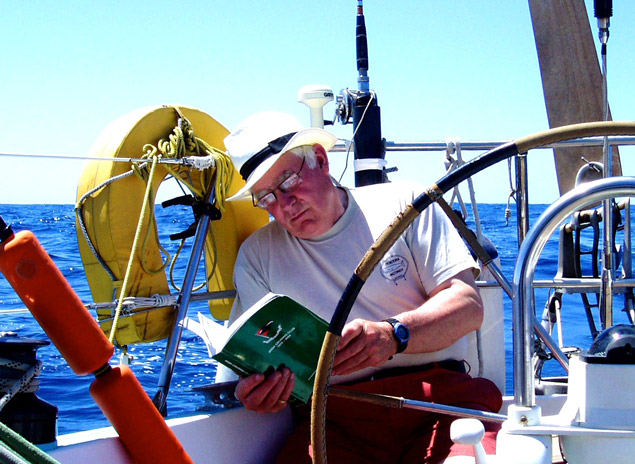
David Whitehead was an occasional contributor and commentator on this blog. It was with much sadness that I heard about his recent passing at the age of 75. Although I never met him, we regularly exchanged emails and his wealth of knowledge on all things climate and energy was breathtaking. He was a qualified geologist and paleontologist and had a career in mining. The Whitehead torpedo was invented by a relative, Robert Whitehead.
His enthusiasm and knowledge will be deeply missed.
A Selection of Writings by David
Ice core proxy data from Greenland ( GISP2 and NORTHGRIP ) show that, in high northern latitudes (around 75ºN,) for the last eleven thousand years, each and every successive millennium has been cooler than its predecessor. In the minor climate cycles of the last four millennia both the low and high temperatures of successive cycles have tended to a lower temperature than the previous cycle. Based on geological history, the predictable evolution of the earth’s orbit, the precession of the equinox and obliquity of the ecliptic and even ignoring the possible effects of variation in solar radiation and the its effects on the magnetosphere, the geological prognosis is for the present long term cooling trend to continue. This will lead eventually to a return to glacial conditions in what are now cool temperate climate zones in both hemispheres. The geographic extent of warm temperate and tropical climate zones will shrink, the atmosphere will become much dryer and much more dusty than it is now and CO2 concentrations will gradually fall to lower levels.
The severity, timing and rate of the slow, long term climate change currently under way cannot yet be forecast with any confidence. Nevertheless, Eemian random temperature variation demonstrates that even while the average temperature of succeeding millennia is falling, one to four century scale warming cycles of as much as 3ºC, like the one we are presently enjoying, still occur. In the Eemian record there were several millennia with warming cycles of this magnitude a few centuries long even when the average temperature was falling relentlessly in succeeding millennia.
A few centuries of warming do not constitute a climate change trend of any significance when viewed in the light of the Pleistocene, or even the much shorter Holocene climate record. While we should enjoy and benefit from the current warming cycle we are deluding ourselves if we think that in the long term climate change can be controlled by attempts to regulate atmospheric CO2 concentrations. Holding vast conferences such as COP 21 every few years may be politically and financially rewarding for their participants but their outcome will effect the climate not at all. They are, however, likely to negatively effect the health and economic well being of the rest of the planet’s population.
Published on Irish Energy Blog, 2015.
Sir, – The Irish Times recently (April 17th) published a factual article about geologically recent climate changes and their impacts on the west coast of Ireland as discussed by Michael Williams, professor of geology at NUIG, with Lorna Siggins.
This drew shrill, not to say hysterical responses, from Messrs Price and O’Raifeartaigh (Letters, April 21st), neither of whom appear to be aware that during 11 separate periods in the last million years, since the Mid-Pleistocene (climate) revolution Ireland was buried beneath kilometers of ice, that sea levels were 150 metres lower than now and that these frigid conditions prevailed for nearly 90 per cent of that million years. Only during brief intervals did the ice melt and the sea rise to near its present levels.
If Mr O’Raifeartaigh were to consult the peer-reviewed literature he would find that the turnaround from warming to cooling in every case occurred when carbon dioxide levels, as recorded in the Vostok ice core, were at their peak value. We are utterly blessed to live in one of these short warm periods which only started 9,000 years ago.
Perhaps Price and O’Raifeartaigh are also ignorant of the fact that from 8,000 to 4,000 years ago our climate was 2-3 degrees warmer than now and that a cooling temperature trend has been in place since then.
In the past we have adapted to both warming and cooling and that is still the best, and probably the only strategy that has any chance of success. Trying to control atmospheric carbon dioxide is a strategy that will only succeed in impoverishing us all.
By the bye, the IPCC and the UK Met Office have both stated unequivocally that the recent extreme weather events can not be attributed to “climate change”.
I do agree with Mr Price on one point, and that is the suggestion that The Irish Times engages someone well versed in climatology and paleoclimatology so that your readers might benefit from more fact and less hysteria about the earth’s history of climate change.
Published in Irish Times, April 2014
Indeed a wealth of knowledge on all things climate and energy, in the very best and most altruistic sense. R.I.P.
ReplyDeleteIn any normal society, his likes would be listened to but not in the modern world. The entire engineering and scientific world can be ignored to propagate the day dreams of children in adult's bodies. RIP.
ReplyDelete